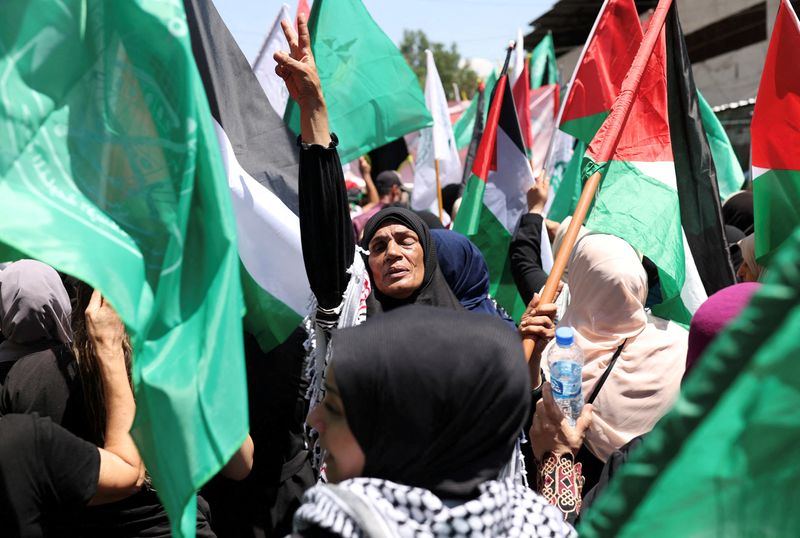By Samia Nakhoul
(Reuters) - As if he knew his time had come, Hamas leader Ismail Haniyeh's last words to Iranian Supreme Leader Ayatollah Ruhollah Ali Khamenei before he was assassinated in Tehran were a Koranic verse about life, death, immortality and resilience.
"It is Allah who gives life and causes death. And Allah is all-aware of all actions ... 'If a leader leaves, another will arise'," Haniyeh said in Arabic. A few hours later he was killed in a suspected Israeli strike on his guest house.
The comment, broadcast on television as Haniyeh addressed Khamenei, reflected deeply-held Islamist beliefs that shaped his life and approach to the Palestinians' conflict with Israel, one inspired by the late Hamas founder Sheikh Ahmed Yassin, who preached Holy Struggle (Jihad) against Israel in the 1980s.
Israel jailed and assassinated Yassin in 2004, but Hamas grew to become a powerful military force.
In a Reuters interview in Gaza in 1994, Haniyeh, who was buried in Qatar on Friday, said Yassin had taught them that Palestinians can only recover their occupied homeland through "the purified arms of its men and their struggle."
No Muslim should die in his bed while "Palestine" remains occupied, he quoted Yassin as saying.
For Palestinian supporters, Haniyeh and the rest of the Hamas leadership are fighters for liberation from Israeli occupation, keeping their cause alive when international diplomacy has failed them.
He said he learnt from Sheikh Yassin "the love of Islam and sacrifice for this Islam and not to kneel down to tyrants and despots."
Haniyeh became the tough-talking face of the Palestinian group's international diplomacy as war raged back in Gaza, where three of his sons - Hazem, Amir and Mohammad - and four of his grandchildren were killed in an Israeli air strike in April. At least 60 other members of his extended family were also killed in the Gaza war.
"The blood of my children is not more valuable than the blood of the children of the Palestinian people ... All the martyrs of Palestine are my children," he said after their deaths.
"Through the blood of the martyrs and the pain of the injured, we create hope, we create the future, we create independence and freedom for our people,” he said. “We say to the occupation that this blood will only make us more steadfast in our principles and attachment to our land.”
'NORMALISATION WON'T END CONFLICT'
Appointed to the Hamas top job in 2017, Haniyeh moved between Turkey and Qatar's capital Doha, escaping the travel curbs of the blockaded Gaza Strip and enabling him to act as a negotiator in ceasefire talks or to speak with Hamas' ally Iran.
"All the agreements of normalisation that you (Arab states) signed with (Israel) will not end this conflict," Haniyeh declared shortly after Hamas fighters' Oct. 7 attack that killed 1,200 people in Israel and took 250 as hostages.
Israel's response to the attack has been a military campaign that has killed around 40,000 people inside Gaza so far, and bombed much of the enclave into rubble.
In May, the International Criminal Court prosecutor's office requested arrest warrants for three Hamas leaders including Haniyeh, as well as Israeli Prime Minister Benjamin Netanyahu, for alleged war crimes. Israel and Palestinian leaders have dismissed the allegations.
Haniyeh is the third Hamas leader to be assassinated by Israel over the past two decades. Israel killed Sheikh Yassin and his successor Abdel-Aziz al-Rantissi within a month of each other in helicopter air strikes in 2004
Khaled Meshaal, tipped to succeed Haniyeh as leader, escaped in 1997 a botched assassination attempt ordered by Netanyahu.
Adeeb Ziadeh, a specialist in Palestinian affairs at Qatar University, said Hamas is an ideology and the killing of Haniyeh will not finish off the group nor make it surrender.
"Every time Hamas lost one leader, another leader came, sometimes even stronger in his performance and fulfilling Hamas principles," Ziadeh said.
Israel said on Thursday that Mohammed Deif, one of the masterminds of the Oct. 7 attack, was killed in an Israeli air strike in Gaza last month. Saleh Al-Arouri, one of the founders of Hamas' military wing, was also killed in an Israeli drone strike on Beirut's southern suburbs in January 2024.
MILITARY FORCE
Hamas' 1988 founding charter called for the destruction of Israel, although Hamas leaders have at times offered a long-term truce with Israel in return for a viable Palestinian state on all Palestinian territory occupied by Israel in the 1967 war. Israel regards this as a ruse.
In the decades since, Hamas has fired thousands of rockets at Israel and fought several wars with the Israeli army while steadily building up its ranks and military force. Hamas also sent suicide bombers into Israel in the 1990s and 2000s.
In 2012, when asked by Reuters if Hamas had abandoned the armed struggle, Haniyeh replied "of course not" and said resistance would continue "in all forms - popular resistance, political, diplomatic and military resistance".
Yet for all the tough language, in public, Arab diplomats and officials had viewed him as relatively moderate compared with more hardline members of the Iranian-backed group inside Gaza, where the military wing of Hamas led by Yahya Sinwar planned the Oct. 7 attack.
While telling Israel's military they would find themselves "drowning in the sands of Gaza", he and his predecessor Khaled Meshaal had shuttled around the region for talks over a Qatari-brokered ceasefire deal with Israel that includes exchanging hostages for Palestinians in Israeli jails.

Yet Haniyeh, a Sunni Muslim, had a major hand building up Hamas' fighting capacity, partly by nurturing ties with Shi'ite Muslim Iran, which makes no secret of its military and financial support for the group.
When he left Gaza in 2017, Haniyeh was succeeded as Hamas leader in the territory by Sinwar, a hardliner who spent more than two decades in Israeli prisons.